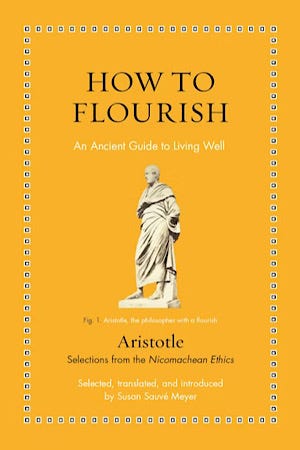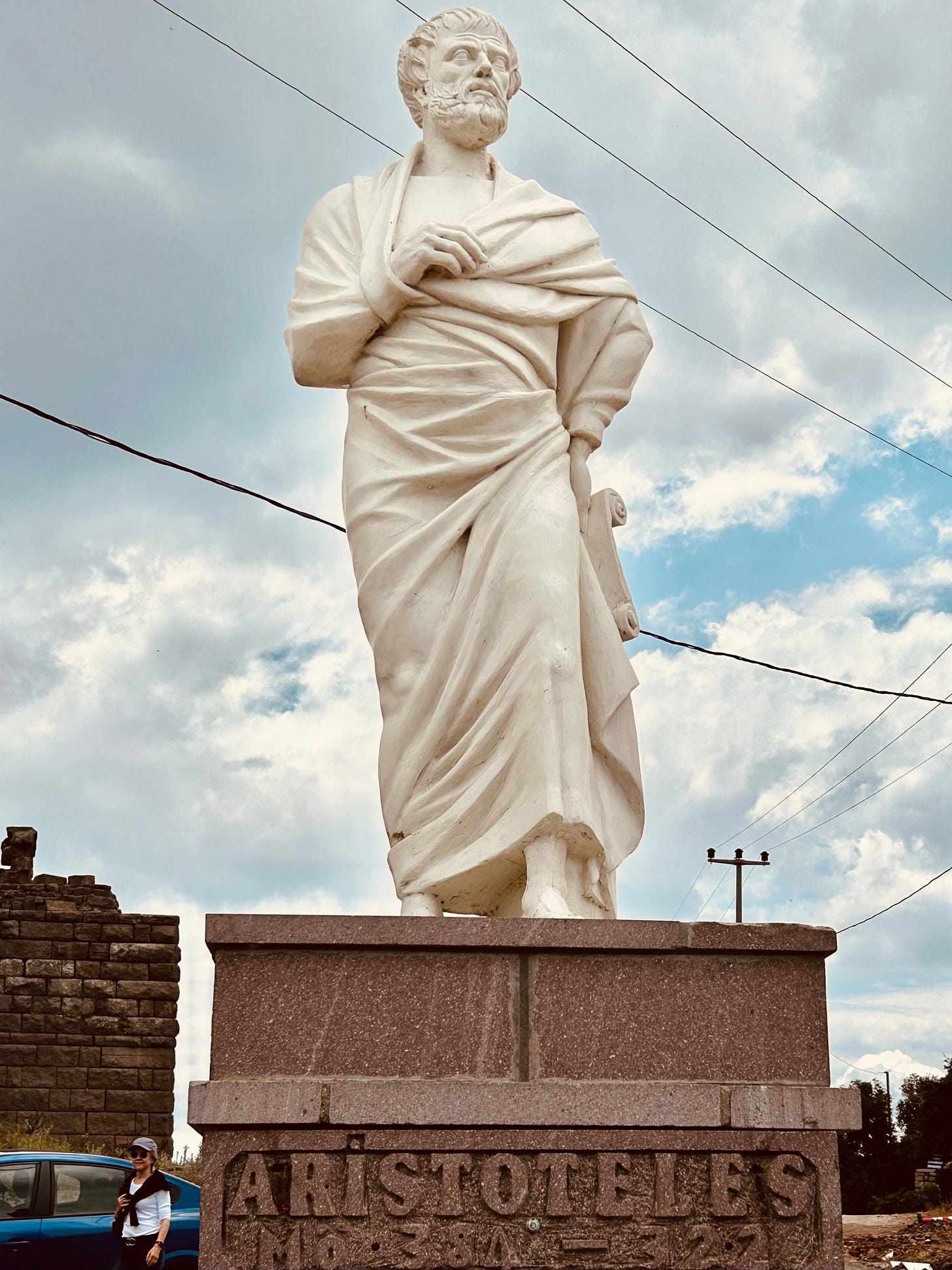[Based on How to Flourish: An Ancient Guide to Living Well, by Aristotle, translated by Susan Sauvé Meyer. Full book series here.]
The big question in philosophy that started with Socrates was: how should we live? In Ancient Greek, a life that goes well was called eudaimonic. It’s a tricky word to translate, but positive psychologists and even policy makers now use it, because they realize that just counting a country’s GDP doesn’t tell us much about how happy people are.
According to the ancient Greeks, when someone’s eudaimon, they’re reaching their full potential as humans. Aristotle’s answer to what makes us eudaimon is straightforward: flourishing.
Susan Sauvé Meyer, who translated parts of Aristotle’s Nicomachean Ethics under the title How to Flourish (part of Princeton Press’ Ancient Wisdom for Modern Readers series), says that the King James Version of the Bible renders the word makarios, which is similar to eudaimonia, as “blessed.” So, Aristotle basically asks what makes someone blessed and answers that being blessed means flourishing.
Aristotle was born in 384 BCE in Macedon, north of Greece. He came from an aristocratic family, and his dad was the royal family’s doctor. When he was 17, he moved to Athens and joined Plato’s Academy.
He left Athens twenty years after Plato’s death in 347 BCE. He spent some time in Assos (modern-day western Turkey), but he returned to Macedon in 342 BCE when King Philip II called him to mentor his son, Alexander (who would later be known as “the Great”). Philip was assassinated in 336 BCE, and Alexander, who was then 20, abandoned his studies and became king. He and Aristotle maintained a lifelong epistolary friendship.
The next year, Aristotle went back to Athens and started his famous school, the Lyceum. But in 323 BCE, Alexander died at the young age of 32, and Aristotle left Athens because of growing anti-Macedonian sentiment. He said he didn’t want to encourage the Athenians to kill another philosopher, a reference to Socrates. Aristotle died that same year on the island of Euboia, where his mother’s family had property. He was 62 years old.
[Statue of Aristotle at Assos, modern western Turkey. Photo by the Author. To the left, near the car, my wife Jennifer.]
Cicero described Aristotle’s writings as “like a pouring out of gold” (Academia Priora, Book 2). But it’s hard to imagine this today because Aristotle is often seen as obscure and complex, making his ideas difficult to understand. Thanks to Cicero and other ancient authors, we know what happened. Aristotle wrote two sets of works: one for his students at the Lyceum (so-called esoteric writings) and one for a wider audience (the exoteric writings). Unfortunately, we don’t have any of the exoteric works, which is was Cicero must have been referring to.
Aristotle wrote two books about ethics: the Eudemian Ethics and the Nicomachean Ethics. The Nicomachean Ethics is the later and more complete work. Meyer doesn’t include the entire Nicomachean Ethics in her book because it’s long, repetitive, and hard to follow. Instead, she chose a selection of highlights that she would give to a student who was just starting to learn about Aristotle. She identifies a number of themes in the Nicomachean Ethics, as following:
The goal of life (book 1)
Building character (book 2)
Taking responsibility (book 3)
Virtue and vice in action (books 3, 4, and 5)
Virtue for a thinking person (books 6)
Losing control (book 7)
Friendship and the good life (books 8 and 9)
How we flourish (book 10)
(The Practical Wisdom podcast has ben taking an in-depth look at the Nicomachean Ethics, the last episode being here.)
With that context in mind, let’s take a closer look at the text by way of a few highlights, accompanied by brief commentaries:
“If our actions have a goal that we wish for because of itself and we wish for everything else because of it. … Clearly this goal would be the good and the best. Knowing it would surely have great impact on our lives, since we would be like archers with a target and more likely to hit the mark. … Since politics employs all other disciplines and legislates what must be done and what not done, its goal would encompass the goals of the others and thus would be the human good.” (1.2)
Aristotle says there are some things we naturally consider good, like happiness. So, other things we do, like building relationships or pursuing a career, are just means to an end, like archers using arrows to hit a target. But here’s the interesting part: he says politics, which is any activity that helps run a society, should aim at the general good of humanity. If only modern politicians would remember that simple truth!
“Now virtue comes in two forms, virtue of intellect and virtue of character. The intellectual kind arises and grows from instruction, which is why it requires experience and time. Virtue of character, on the other hand, results from our regular practice [ethos]—which is why our term for character [ēthos] is a slight modification of ‘ethos.’” (2.1)
According to Aristotle there are two types of virtue: intellectual and moral. Intellectual virtue comes from learning, which takes time and practice to understand. Moral instruction also takes time, but it works differently. It’s based on practice, which in Greek is called “ethos.” That’s why the word for character, “ēthos,” is so similar: good character is learned through practice (not just studying).
“What we do voluntarily gets praised and blamed, while we receive forgiveness (and sometimes even pity) for what we do involuntarily. So our inquiry into virtue presumably ought to demarcate what is voluntary and what is involuntary. … It is ridiculous to blame the externals instead of yourself for being so susceptible to them—or to take responsibility for your noble acts but blame your shameful acts on the pleasant externals.” (3.1)
We can only be blamed or praised for what we choose to do. If we do something involuntarily, we can either excuse or pity ourselves, depending on the situation. But Aristotle also warns that we can’t pick and choose: we can’t accept praise for our good actions and blame external factors, like temptations, for our bad actions. In both cases, we’re the ones who decide to do or not to do something, so the moral responsibility lies with us.
“Let us now take up the virtues individually and identify each by its objects and its orientation toward them. … By now it is clear that bravery is an intermediate disposition in matters of fear and boldness. … You are not a coward for being afraid that your child or wife will be assaulted … or brave if you are emboldened at the prospect of being whipped. … Bravery is a matter of being as undaunted as a human can be. Brave people will be frightened by [some] things, but in the right way, and they will endure them as thinking dictates. Their aim is to do what is noble, since that is the goal of virtue.” (3.6-7)
Here’s an example of how Aristotle thought virtues are in the middle between two bad qualities. Being brave isn’t about being a coward or recklessly facing danger. It’s about being as brave as a human can be. Our goal is to act in a virtuous way, but we’re still humans, not gods.
“We might grasp what good judgment is by considering those to whom we ascribe it. People with good judgment, it seems, are capable of excellent deliberation about what is good for them and useful—not with a view to some particular objective such as health or strength, but more generally with a view to living well. … We ascribe good judgment to Pericles and people like him: they are good at grasping what is good for themselves and for human beings in general.” (6.5)
So, how do we figure out what’s virtuous and what counts as good judgment? Well, it’s all about learning from the best. By studying and trying to be like people who are virtuous and have good judgment, we can figure it out. The Stoics later on really emphasized this idea, advising us to pick one or more role models and trying to model our behavior after theirs. Modern psychology also supports the notion. Note that Aristotle here specifically mentions Pericles, the leader of Athens during the early part of the Peloponnesian War. Pericles was known for his wisdom and judgment, and people accordingly admired him for it.
“When you exercise self-control, you stick to your judgment. When you lose control, you abandon your judgment. … Just because they utter words of knowledge does not mean that they know what they are saying. … This is how we should construe what people are saying when they lose control; they are like actors reciting lines.” (7.1, 3)
Acting virtuously, like being temperate, comes from good judgment. But when we don’t do it, it’s because we make bad judgments. It’s true that some people use words of wisdom, but they don’t really know what they’re talking about. So, when people act impulsively, they give excuses for their behavior—to themselves and others—that sound more like lines from an actor’s script than what they really think.
“Friendship is a virtue, or connected to virtue. Also, it is utterly indispensable in life. No one would choose to live without friends, even if they had all the other good things in life.” (8.1)
Cicero and Seneca later echoed this idea, and Epicureans believed it too. As it turns out, friendship is a key part of life, so we should really value it. Furthermore, modern research also agrees with this ancient insight into human nature.
“Virtuous actions in politics and war do stand out in their splendor and importance—but they deprive us of leisure, they are goal directed, and they are not chosen because of themselves. Activity of intellect, on the other hand, seems to be exceptionally serious (since it is theoretical) and to be directed at no goal beyond itself. It seems to have its own proper pleasure—which enhances the activity—and to be as self-sufficient, leisured, and weariless as is possible for a human being.” (10.7)
Near the end of the Nicomachean Ethics, Aristotle concludes that the highest form of human activity is intellectual contemplation, because—as he says—it gives us pleasure in its own right, not as a result of pursuing any additional goal. This is not very dissimilar from the conclusion arrived at by Aristotle’s teacher, Plato, though Aristotle adds that a life of politics, which is in the service of human happiness, is second best. Then again, Plato also gave much importance to politics in his Academy.
[Previous installments: I, II, III, IV, V, VI, VII, VIII, IX, X, XI, XII, XIII, XIV, XV, XVI, XVII, XVIII, XIX, XX, XXI, XXII, XXIII, XXIV, XXV, XXVI, XXVII.]






Exoterica--and golden means--forever! Thanks, Massimo.
„Near the end of the Nicomachean Ethics, Aristotle concludes that the highest form of human activity is intellectual contemplation, because—as he says—it gives us pleasure in its own right, not as a result of pursuing any additional goal.“
Because it gives pleasure in its own right. Between the lines the Epicurean goal of life ->Pleasure<- is confirmed by Aristoreles.
I think everything what is pursued for „it own sake“ like virtue, friendship means we have a positive affection for it and so in the end a kind of Pleasure in the core.